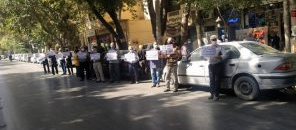October 08, 2021

The summer’s rash of large anti-regime demonstrations has come to an end, perhaps defeated by the huge spike in coronavirus cases in August. Many small protests continue, usually involving a mere dozen or so people, and they are largely focused on local labor issues.
The protests against power blackouts ended as the blackouts became less frequent with the end of summer. Power restrictions on major industries, especially steel and cement, which are major consumers of electricity, ended on the first day of autumn, September 23.
Teacher protests, which date back many years with rarely a break, are the most frequent protests seen these days, as teachers continue to demand substantial pay increases, which have been denied by successive governments.
The Center for Human Rights in Iran (CHRI) reported last month that in one of his first acts as president, Raisi reversed a pay raise for teachers that the Rohani Administration had approved just before leaving office. Some suspected the Rohani Administration was playing games since it approved the pay raise in its last days after having denied the teachers demands for eight years.
CHRI reported that teachers gathered in front of the Majlis September 5 and chanted that the poverty line is set at 120 million rials a year while their pay is 30 million rials or 75 percent below the poverty line.
The teachers have gotten raises over the years, but they are routinely far less than inflation and leave the teachers ever deeper in the hole.
CHRI reported that in the five years from 2014 to 2019, the regime executed three protesting teachers, two Arabs and a Kurd.
The Human Rights Activists News Agency (HRANA), which tracks protests day-by-day, said it recorded demonstrations by teachers in 36 cities across the country on September 25 alone.
Other protests in recent weeks have come from coal miners, petrochemical workers, rejected job applicants at the Karname-Sabz company, municipal workers in Abadan and Hoveyzeh and the Haft Tappeh Sugarcane Refinery, where workers have been protesting for more than three years ever since the plant was privatized. That privatization was ordered reversed by the courts several weeks ago, but the court order has not yet been carried out.
Meanwhile, Farzaneh Zilabi, the attorney representing the Haft Tappeh workers was sentenced to one year in prison for “propaganda against the regime.”
